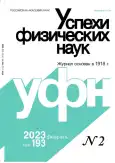Том 193, № 2 (2023)
Reviews of topical problems
General relativity effects in precision spin experimental tests of fundamental symmetries
Аннотация
A search for the $P$- and $CP(T)$-violating electric dipole moments (EDM) of atoms, particles, and nuclei with sensitivity up to $10^{-15}$ in units of the magnetic dipole moments, allowed by all discrete symmetries, is one of the topical problems of modern physics. According to Sakharov, $CP$ violation is one of the three key criteria of the baryogenesis in the generally accepted paradigm of the Big Bang cosmology. All three criteria are supported by the Standard Model, but it fails to describe quantitatively the observed baryon asymmetry of the Universe. This is regarded as a strong argument in favor of the existence of $CP$-symmetry breaking mechanisms beyond the minimal Standard Model, which can lead to measurable EDMs of atoms, particles, and nuclei. Searches for the EDM via the spin rotation in electric fields are currently underway in dozens of laboratories worldwide. Direct searches for the EDM of charged particles and nuclei are possible only in storage rings (COSY, NICA). After successful studies by the JEDI collaboration at the COSY synchrotron, at the forefront in the field is the search for the proton EDM in an electrostatic storage ring with the proton spin frozen at the magic energy with the projected sensitivity $d_p\sim 10^{-29} e$ cm. A prototype PTR storage ring is proposed as a precursor to such a dedicated storage ring, with the prospect of the frozen proton spin ring becoming a part of the physics at CERN beyond the Large Hadron Collider program. Following a brief introduction to $CP$-violation physics and baryogenesis, the review presents a detailed discussion of significant contributions to the spin dynamics from terrestrial gravity along with new effects of Earth's rotation in ultrasensitive searches for the EDM of charged particles and neutrons. Quite remarkably, for the projected sensitivity to the proton EDM, these false EDM effects can exceed the signal of the proton EDM by one to two orders of magnitude and become comparable to the EDM contribution in experiments with ultracold neutrons. We also discuss the role of a precessing spin as a detector of axion-like dark matter, and consider applications of quantum gravitational anomalies to dense matter hydrodynamics and spin phenomena in noncentral nuclear collisions.
Uspehi fizičeskih nauk. 2023;193(2):113-154
 113-154
113-154


Rogue waves in the sea: observations, physics, and mathematics
Аннотация
Rogue waves are anomalously high waves that may suddenly form on the sea surface. At the dawn of the 21st century, they attracted the interest of researchers, from oceanographers to mathematicians. The review discusses the results of their research: physical mechanisms leading to the generation of anomalously high waves and respective mathematical models, observational data, results of direct numerical simulations and laboratory experiments, and new approaches to modeling and forecasting extreme sea waves.
Uspehi fizičeskih nauk. 2023;193(2):155-181
 155-181
155-181


Physics of our days
Spectroscopy of the interaction of a low-energy electron beam with organic luminescent molecules
Аннотация
We present a brief review of the results of spectroscopic studies of the interaction of a beam of low-energy monokinetic tunable-energy electrons with organic luminescent molecules. Data are presented on elastic scattering, the excitation of vibrational and electronic transitions, luminescence properties, and the formation of positive and negative ions for a number of molecules. It is shown that the passage of electrons through the gaseous and thin-film phases of organic samples is close in nature. For all processes, except the excitation of triplet transitions and the formation of negative ions, the dipole interaction prevails, even in the near-threshold region. The results of the conducted research will be useful for understanding the conversion of electron energy by organic molecules in electronics, where the direct study of elementary processes is very difficult, as well as in biology and plasma chemistry.
Uspehi fizičeskih nauk. 2023;193(2):182-191
 182-191
182-191


Instruments and methods of investigation
Diffusive methods of isotope separation in plasma
Аннотация
Studies of the separation of stable isotopes in plasma are reviewed with a focus on diffusive separation methods. The efficiency of enrichment processes is analyzed using a unified approach to the calculation of diffusive separation processes in a weakly ionized plasma. Various separation mechanisms are discussed, including centrifugal techniques, diffusive friction, thermal diffusion, and isotope cataphoresis. Results of calculations and experiments are compared. Various plasma separation devices are reviewed, and the values of specific energy consumption in different methods are compared. A conclusion is made that plasma separation methods, despite relatively high energy consumption, can be competitive in the case of elements that do not have volatile compounds under normal conditions, for which state-of-the-art centrifugal cascades cannot be used.
Uspehi fizičeskih nauk. 2023;193(2):192-205
 192-205
192-205


NICA Booster: a new-generation superconducting synchrotron
Аннотация
In November–December 2020 and in September 2021, the first two beam runs of the Booster Synchrotron—a new cyclic accelerator of the NICA (Nuclotron-based Ion Collider fAcility) complex—were performed at the Laboratory for High Energy Physics, Joint Institute for Nuclear Research. New technologies (previously not used in Russia) were developed for the Booster's construction based on new physical and technological solutions. We describe these technologies and solutions and also the methods used in constructing and testing the accelerator systems. We present the results of the first two runs.
Uspehi fizičeskih nauk. 2023;193(2):206-225
 206-225
206-225


Physics news on the Internet (based on electronic preprints)
Uspehi fizičeskih nauk. 2023;193(2):226-226
 226-226
226-226


Personalia
In memory of Lev Petrovich Pitaevskii
Uspehi fizičeskih nauk. 2023;193(2):227-228
 227-228
227-228


In memory of Yurii Mikhailovich Romanovsky
Uspehi fizičeskih nauk. 2023;193(2):229-230
 229-230
229-230


In memory of Valery Anatol'evich Rubakov
Uspehi fizičeskih nauk. 2023;193(2):231-232
 231-232
231-232









